A Biography of William Blackstone (1723-1780)
 On October 25, 1758 as William Blackstone approached the
podium in the Oxford lecture hall he knew he was a failure.
The thirty year old lawyer, nearsighted, already portly,
chronically ill, now ready to read his notes in his grating
voice, had spent the last seven years before the Bar in
London with, a sympathetic biographer wrote, "little notice
or practice."
On October 25, 1758 as William Blackstone approached the
podium in the Oxford lecture hall he knew he was a failure.
The thirty year old lawyer, nearsighted, already portly,
chronically ill, now ready to read his notes in his grating
voice, had spent the last seven years before the Bar in
London with, a sympathetic biographer wrote, "little notice
or practice."
Now addressing the students assembled before him to hear the first of his lectures on English law, Blackstone began with an apology. Speaking in the third person Blackstone worried aloud that if his plan was "crude or injudicious, or the execution of it lame or superficial" he would set back the study of law.
"And this he must more especially dred, when he feels by experience how unequal his abilities are to complete, in the manner he could wish, so extensive and arduous a task; since he freely confesses, that his former more private attempts have fallen very short of his own ideas of perfection."
Little could Blackstone know that the lectures he began so tentatively that day would be published as Commentaries on the Laws of England, a work that would dominate the common law legal system for more than a century. Nor could he foresee that his words would shape the Declaration of Independence, Constitution and primal laws of a land he considered no more than conquered territory of the British crown. He could not forsee another failure in life studying his Commentaries in the frontier village of New Salem, Illinois, teaching himself law. And little could he imagine that two hundred years later gangsters would call their lawyers by his name.
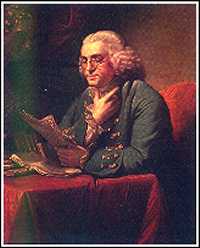 Blackstone spoke and wrote in the times of Oliver
Goldsmith and Samuel Johnson, Edward Gibbon and Adam Smith,
David Hume and Benjamin Franklin. Cultural institutions such
as the British Museum, that today seem ancient, were in their
infancy. The law then, as now, was rooted in everday life but
removed by lawyers and courts from most people's lives.
Blackstone's task, and his ultimate accomplishment, was
to open the law to many for whom it had been closed.
Blackstone spoke and wrote in the times of Oliver
Goldsmith and Samuel Johnson, Edward Gibbon and Adam Smith,
David Hume and Benjamin Franklin. Cultural institutions such
as the British Museum, that today seem ancient, were in their
infancy. The law then, as now, was rooted in everday life but
removed by lawyers and courts from most people's lives.
Blackstone's task, and his ultimate accomplishment, was
to open the law to many for whom it had been closed.
Despite his initial misgivings, the lectures were an immediate success, breathing life into a dry and poorly taught subject. Blackstone's lectures were published as the Commentaries in England between 1765 and 1769. An American edition published in Philadelphia between 1771-72 sold out its first printing of 1,4OO and a second edition soon appeared. The Commentaries were translated into French, German and Russian. During his lifetime the work earned an estimated 14,OOO pounds, an enormous amount of money at the time. His work would also earn him belated success as a lawyer, politician, judge and scholar. Blackstone, however, more than paid for his success; he and his book became the targets of some of the most vitriolic attacks ever mounted upon a man or his ideas.
In trying to comprehend the whole of British law and present it logically Blackstone divided the law into four volumes and themes. Book I covered the "Rights of Persons," a sweeping examination of British government, the clergy, the royal family, marriage, children, corporations and the "absolute rights of individuals." Book II, on the "Rights of Things," should more properly have been called the Rights that people have in Things. It begins with the observation that "There is nothing which so generally strikes the imagination and engages the affections of mankind, as the right of property." In hundreds of pages of arcane analysis he then disproves the point. Book III covers "Private Wrongs," today known as torts. Book IV covers "Public Wrongs," crimes and punishment, including offenses against God and religion. Blackstone had no illusions that he had covered every important aspect of the law adequately; his lectures and the books were designed as an introduction to the whole of the law.
Human laws, Blackstone believed, were like scientific laws. They were creations of God waiting to be discovered just as Issac Newton had discovered the laws of gravity a century before. "Thus we say, the laws of motion, of gravitation, of optics, or mechanics, as well as the laws of nature and of nations." Law flowed from the superior to the inferior, be it God, monarch or nation, and the inferior was compelled to obey. He acknowledged humans as "the nobelest of all sublunary beings, a creature endowed with both reason and freewill" but decreed that there were "certain immutable laws of human nature, whereby freewill is in some degree regulated and restrained" and that God gave "the faculty of reason to discover the purport of those laws."
In Blackstone's more worldly scheme a King could do no wrong. "The king," he wrote, "is not only incapable of doing wrong, but even of thinking wrong: in him there is no folly or weakness." A law could, however, could be illogical and therefore irrational and open to criticism. "Thus the statute of king Edward IV, which forbad the fine gentlemen of those times (under the degree of a lord) to wear pikes upon their shoes or boots of more than two inches in length, was a law that savored of oppression; because, however ridiculous the fashion then in use might appear, the restraining it by pecuniary penalties could serve no purpose of common utility."
Blackstone was not a pure monarchist. In his perfect world, which he believed the United Kingdom of his day closely resembled, Parliament played a central role as the source of legislation, and within Parliament the House of Commons and the House of Lords balanced each other. Blackstone did not invent the concept of separation of powers but he made the idea concrete and accessible for others to use.
Blackstone, who according to James Boswell in his Life of Johnson "had a bottle of port before him" during the composition of the Commentaries finding his mind "invigorated and supported in the fatigue of his great work," often lead his readers through a maze of conflicting absolutes. In Book I he wrote:
"To bereave a man of life, or by violence to confiscate his estate, without accusation or trial, would be so gross and notorious an act of despotism, as must once convey the alarm of tyranny thoroughout the whole kingdom. But confinement of the person, by secretly hurrying him to goal, where his sufferings are unknown or forgotten, is a less public, a less striking, and therefore a more dangerous engine of arbitrary government."But in the same paragraph he contends that such actions may be necessary and proper.
Blackstone may be said to have loved humanity and disliked people. He saw nothing wrong with restricting the vote to property owners because he thought those without property would have too little interest in public affairs and would be easily mislead. He abhorred the very idea of slavery in England ("indeed it is repugnant to reason, and to the principles of natural law,") declaring that anyone brought in slavery to England was immediately freed, but was indifferent to its practice in America. He flatly declared that "Christianity is part of the laws of England" but stated that the law of England "gives liberty, rightly understood, that is, protection to a jew, turk, or a heathen, as well as to those who profess the true religion of Christ."
Blackstone may have proved his best and worst critic when he wrote: "It is well if the mass of mankind will obey the laws when made, without scrutinizing too nicely into the reasons of making them."
William Blackstone, however, had no shortage of critics, then or now. Lord Ellenborough said of Blackstone "it might be said of him, at the time he was composing the book, that it was not so much his learning that made the book, as it was the book that made him learned."
A contemporary British writer known only by the pseudonym "Junius" wrote "For the defense of truth, of law and reason the Doctor's book may be safely consulted: but whoever wishes to cheat a neightbour of his estate, or to rob a country of its rights, need make no scruple of consulting the Doctor himself."
Philosopher Jeremy Bentham attended Blackstone's lectures as a student. Blackstone, he wrote, was a "formal, precise and affected lecturer - just what you would expect from the character of his writings: cold, reserved and wary." Blackstone's comments on the King, Bentham said "stuck in my stomach." Bentham went on to be Blackstone's harshest enemy, denouncing his work as "ignorance on stilts."
Another prominent critic was Joseph Priestley, best known to history for his electrical and chemical discoveries. Some passages in the Commentaries on religious dissenters prompted Priestley to write a pamphlet attacking Blackstone, starting a series of published replies, countercharges and letters. Blackstone seemed confused why the scientist should attack him "I must first of all correct a mistake, which Dr. Priestly seems to have fallen into, by fancying that the offensive passages in my book were personally leveled at him."
William Blackstone was born on July 10, 1723, four months after his father died. After his mother died when he was 12, his uncle provided for him, securing through some influence admission to a good school. Blackstone entered Oxford at 15, studying the classics as well as mathematics and logic. He developed a talent as a minor poet. At 18 he entered the Middle Temple Inn of Court, one of the training grounds for English lawyers in London. Upon leaving Oxford for his law training he wrote a long poem called "The Lawyer's Farewell to His Muse" which reads in part:
Then welcome business, welcome strife
Welcome the cares and thorns of life,
The visage wan, the pore-blind sight,
The toil by day, the lamp by night,
The tedious forms, the solemn prate,
The pert dispute, the dull debate,
The drowsy bench, the babbling hall,
For thee fair Justice, welcome all.
Blackstone completed his legal studies and was called, or admitted, to the Bar in 1746. James Clitherow, his biographer and brother-in-law, blamed his failure in the law on "not having any powerful friends or connections to recommend him." The truth lies closer to his indifferent abilities in court. "My temper, constitution, inclinations and a thing called principle, have long quarrelled with active life," he wrote in July 1753, "and have assured me that I am not made to rise in it." During his time in London Blackstone was drawn back to Oxford, actively participating in the university's activities. He applied for a position but lost it for political reasons, having backed the wrong candidate for Parliament, a mistake he would not repeat again. When he began the lectures on English law the "intervening cloud" of his life disappeared and his "great genius...broke forth, with so much splendor" according to his admiring brother-in-law.
In 1761 Blackstone married Sarah Clitherow, with whom he had nine children. In that same year he was appointed a King's Counselor and elected to the House of Commons. Blackstone was a loyal if undistinguished Tory, voting, for example, against the repeal of the Stamp Act directed against the American colonies. Some of his colleagues called him a "toady" for his willingness to curry favor with the establishment that once rejected him. In one debate the opposition turned the words of the Commentaries against Blackstone's argument. In the next edition Blackstone rewrote the passage.
In 177O Blackstone was knighted and accepted an appointment as a Justice of the Court of Common Pleas. Blackstone was often in poor health, and was irritable and impatient on the bench. As a judge his record was no more distinguished than his time at the Bar. He died of dropsy on Feb 14, 1780 at the age of 57, four years after the American Revolution he unintentionally inspired.
 In his 1941 book The Mysterious Science of the Law Daniel Boorstin wrote that no other book except the Bible played a greater role in the history of American
institutions. The Founders of the country found their
philosophy in John Locke and their passion in Thomas Paine,
but they found the blueprint for a new nation in Blackstone.
To be sure, they did not construct the government as
Blackstone would have designed it; they added and subtracted
from it as they went along but the foundation was built on
Blackstone.
In his 1941 book The Mysterious Science of the Law Daniel Boorstin wrote that no other book except the Bible played a greater role in the history of American
institutions. The Founders of the country found their
philosophy in John Locke and their passion in Thomas Paine,
but they found the blueprint for a new nation in Blackstone.
To be sure, they did not construct the government as
Blackstone would have designed it; they added and subtracted
from it as they went along but the foundation was built on
Blackstone.
The philosophy of the Declaration of Independence asserting the "self-evident" "unalienable Rights" of people granted by "the Laws of Nature and of Nature's God" could have come, and probably did, from Blackstone's description of the rights of Englishmen under the British Constitution. The indictment against the Crown, the bulk of the Declaration, recites many of the absolute rights of individuals covered by Blackstone including the prohibition of taxation without consent.
Thomas Jefferson, the chief drafter of the Declaration, was certainly familiar with Blackstone. Jefferson had a love- hate relationship with the Commentaries. In 1812 he wrote that it was the "most elegant and best digested of our law catalogue," but in the same letter complained that it had been "perverted" and responsible for "the degeneracy of legal science."
Jefferson said that Blackstone and David Hume's History of England "have done more towards the suppression of the liberties of man, than all the millions of men in arms of Bonaparte," because both books glorified the systems Jefferson had devoted his life to fighting. Yet on two occasions Jefferson listed the Commentaries as required reading for law students.
Jefferson's animosity toward Blackstone grew in part out of his disdain for the superficial treatment of the law. Jefferson learned law by reading Coke upon Littleton, a tedious book that lead Jefferson to write to a friend, " I do wish the Devil has old Cooke, (sic) for I am sure I never was so tired of an old dull scoundrel in my life."
Coke, a heroic figure who as a judge defied the king in a face to face confrontation and supported Parliament over royalty, improved with age in Jefferson's eyes. Coke was "uncouth but cunning learning" but more comprehensive than Blackstone. "A student finds there" Jefferson wrote of Blackstone. "a smattering of everything, and his indolence easily persuades him that if he understands that book, he is master of the whole body of law. The distinction between these, and those who have drawn their stores from the rich and deep mines of Coke on Littleton, (sic) seems well understood even by the unlettered common people, who apply the appelation of Blackstone lawyer to these emphemeral insects of the law."
Jefferson's core disagreement with Blackstone, however, was Jefferson's opposition to adopting English common law in America. He was not alone in this view. Many advocated adopting a civil code along ancient Roman and contemporary European lines, and saw it as a final break away from England. In the early 1800s New Jersey, Pennsylvania and Kentucky passed 'noncitation'statutes barring the adoption of English common law.
However, both common law and Blackstone were too pervasive to be suppressed, and the centuries of precedents embodied in the Commentaries still influence American law today. A typical example is the Illinois statute adopting common law "prior to the fourth year of James the First," or 16O7, with certain exceptions from the reigns of Elizabeth I and Henry VIII. Common law precedents can at times create problems in modern law that states have to correct by statute. The leading example is the widespread abolition by statute of the Rule in Shelley's Case, an obscenely obscure point of law on the transfer of property originating in the 13OO's. "It is revolting," wrote Oliver Wendel Holmes in 1897 of ancient precedents in general "to have no better reason for a rule of law than that so it was laid down in the time of Henry IV." Revolting or not this feature remains a central part of the law and Blackstone is still the guide.
Jefferson gave up the practise of law to the Blackstone lawyers and despaired of the profession in words as true today as they were in 1810. Writing to a friend who asked his advice on his son's career, Jefferson said "Law is quite overdone. It is fallen to the ground, and a man must have great powers to raise himself in it to either honor or profit. The mob of the profession get as little money and less respect, than they would by digging the earth."
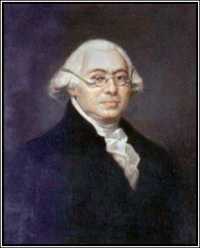 Another Blackstone critic James Wilson, a signer of both
the Declaration of Independence and the Constitution and
later a Supreme Court Justice. Wilson published several
tracts and lectures on Blackstone praising him for his
"uncommon merit" as a writer but damning him for his
philosophy.
Another Blackstone critic James Wilson, a signer of both
the Declaration of Independence and the Constitution and
later a Supreme Court Justice. Wilson published several
tracts and lectures on Blackstone praising him for his
"uncommon merit" as a writer but damning him for his
philosophy.
Wilson's opinion on Blackstone found a practical expression in the case Chisholm v.Georgia, decided in the Supreme Court in 1793. A British citizen employed two South Carolinians to recover property confiscated by the state of Georgia. The case was brought to the Supreme Court. Georgia refused to answer, denying the jurisdiction of the Court to hear the case. The Court ruled that the creation of the United States created a greater sovereignty in the "more perfect Union" and that states had surrendered a part of their sovereignty as the price of adopting the Constitution. In his opinion Wilson attacked Blackstone as the author of the view that the state is sovereign and immune from suit. "The sovereign," Wilson wrote, "when traced to the source, must be found in the man." The nub of Wilson's opposition to Blackstone was expressed "Man, fearfully and wonderfully made, is the workmanship of his all perfect CREATOR: A State, useful and valuable as the contrivance is, is the inferior contrivance of man; and from his native dignity derives all its acquired importance."
The Georgia legislature immediately reacted by passing a law prohibiting the execution of the decision. Legislators from other states, also facing claims from British creditors, protested. The reaction to the decision lead to the passage and eventual ratification of the Eleventh Amendment, a curious part of the Constitution now little noticed or understood. The Amendment's restriction against the federal courts to hear "any suit in law or equity, commenced or prosecuted against one of the United States by Citizens of another State, or by Citizens or Subjects of any Foreign State" is a codification of Blackstone's teachings and indeed may be considered his fingerprint on the Constitution.
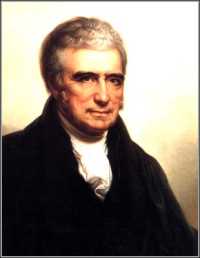 Blackstone played an more obscure but important part in
the most important case of the Supreme Court. Unlike Wilson,
Chief Justice John Marshall, whose father had subscribed to
the first American edition of the Commentaries, found much to
like in Blackstone, especially when it supported his
opinions. Blackstone's definition of a writ of mandamus, an
order directing the state to perform at act, was a linchpin
in Marbury v. Madison, the 1803 case first establishing
judicial review by the Supreme Court. William Marbury, a
last minute appointee of the outgoing Adams administration,
sued Secretary of State James Madison seeking a writ to
compel the government to carry out the appointment.
Marshall, himself appointed Chief Justice in the last three
weeks of Adams' term, blasted Jefferson for denying the
commission and ruled that Marbury had an unquestioned right
to the appointment. Marshall then performed an act of
judicial judo, ruling that Congress had no right to grant the
Supreme Court the power to issue a writ of mandamus, as
defined by Blackstone. Marshall ruled the act
unconstitutional because it granted the Court too much power,
at the same time securing the far greater power of judicial
review. Marbury lost his battle, but Jefferson lost the war
against Marshall.
Blackstone played an more obscure but important part in
the most important case of the Supreme Court. Unlike Wilson,
Chief Justice John Marshall, whose father had subscribed to
the first American edition of the Commentaries, found much to
like in Blackstone, especially when it supported his
opinions. Blackstone's definition of a writ of mandamus, an
order directing the state to perform at act, was a linchpin
in Marbury v. Madison, the 1803 case first establishing
judicial review by the Supreme Court. William Marbury, a
last minute appointee of the outgoing Adams administration,
sued Secretary of State James Madison seeking a writ to
compel the government to carry out the appointment.
Marshall, himself appointed Chief Justice in the last three
weeks of Adams' term, blasted Jefferson for denying the
commission and ruled that Marbury had an unquestioned right
to the appointment. Marshall then performed an act of
judicial judo, ruling that Congress had no right to grant the
Supreme Court the power to issue a writ of mandamus, as
defined by Blackstone. Marshall ruled the act
unconstitutional because it granted the Court too much power,
at the same time securing the far greater power of judicial
review. Marbury lost his battle, but Jefferson lost the war
against Marshall.
Writing in 1807 on the evidence in the treason trial of former vice-president Aaron Burr, Marshall cited the works of Blackstone and others as "not to lightly be rejected." "These books," he wrote, "are in the hands of every student. Legal opinions are formed upon them, and those opinions are afterwards carried to the bar, the bench, and the legislature."
Blackstone played an influential part in the drafting and ratification of the Constitution. In his 1985 book Novus Ordo Seclorum Forrest McDonald called Blackstone's contributions "pervasive." The Commentaries were cited if not by name than by inference many times during the constitutional convention. The most direct and lasting force of his ideas concerned ex post facto laws, rules of laws designed to retrospectively regulate conduct. During the debates James Madison questioned whether the provision banning ex post facto laws in the draft of the Constitution would apply to civil cases. The next day delegate John Dickinson announced that he had consulted his Blackstone and found that the illegitimacy of ex post facto laws applied only in criminal cases. The matter was dropped, and Blackstone's edict remains in force today.
In the ratification debate Blackstone was used by both sides. Alexander Hamilton, following his early devotion to Blackstone in the cause of the Revolution, cited the Commentaries in Federalists No. 69 and 84 to bolster the case for the Constitution. Patrick Henry, as passionately opposed to the Constitution as he had been to the George III, argued against adoption in the Virginia Convention because the Constitution failed to provide for jury trials in civil cases as advocated by Blackstone.
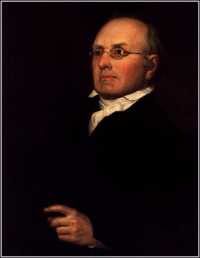 American lawyers in the early republic relied on
Blackstone as the primary and often only source of the common
law. American commentaries on the Commentaries appeared, such
as 1814's Law Miscellanies by Hugh Brackenridge, called the
Pennsylvania Blackstone. The Americanized versions never
supplanted the original. One Commentaries trained lawyer
James Kent, later a Chancellor in New York, between 1826-183O
wrote his Commentaries on American Law critical of Blackstone
and substituting much Roman law and civil code in place of
the traditional common law. Edward Story, who also learned
law through reading Blackstone, became the youngest Supreme
Court Justice and author of many influential law books.
Blackstone was the unseen teacher for uncounted numbers of
American lawyers, first among them Abraham Lincoln.
American lawyers in the early republic relied on
Blackstone as the primary and often only source of the common
law. American commentaries on the Commentaries appeared, such
as 1814's Law Miscellanies by Hugh Brackenridge, called the
Pennsylvania Blackstone. The Americanized versions never
supplanted the original. One Commentaries trained lawyer
James Kent, later a Chancellor in New York, between 1826-183O
wrote his Commentaries on American Law critical of Blackstone
and substituting much Roman law and civil code in place of
the traditional common law. Edward Story, who also learned
law through reading Blackstone, became the youngest Supreme
Court Justice and author of many influential law books.
Blackstone was the unseen teacher for uncounted numbers of
American lawyers, first among them Abraham Lincoln.
A typical Lincoln legend has it that a lawyer migrating west stopped in New Salem, Illinois, and sold a barrel full of lawbooks, including Blackstone, to the rough-hewn storekeeper and surveyor in order to make room in the covered wagon. From this fateful accident, Lincoln is said to have thrown himself day and night into studying law.
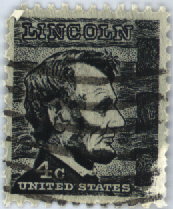 The truth, however, is, as Lincoln later wrote,
he first thought of becoming a blacksmith, rejecting the
idea of studying law because of his poor education and slim
prospect of success. In 1834 Lincoln, running for state
representative, meet fellow candidate and lawyer John Staurt,
who encouraged him to take up the profession. Lincoln
borrowed Staurt's books, read the first forty pages of
Blackstone on the walk home and "went at it in good earnest."
When Lincoln was running for President in 1860 he replied to
an inquiry on "the best mode of obtaining a thorough
knowledge of the law." "The mode is very simple," Lincoln
wrote, "though laborious and tedious. It is only to get the
books, and read, and study them carefully. Begin with
Blackstone's Commentaries, and after reading it carefully
through, say twice, take up Chitty's Pleading, Greenleaf's
Evidence, & Story's Equity &c in succession. Work, work,
work, is the main thing."
The truth, however, is, as Lincoln later wrote,
he first thought of becoming a blacksmith, rejecting the
idea of studying law because of his poor education and slim
prospect of success. In 1834 Lincoln, running for state
representative, meet fellow candidate and lawyer John Staurt,
who encouraged him to take up the profession. Lincoln
borrowed Staurt's books, read the first forty pages of
Blackstone on the walk home and "went at it in good earnest."
When Lincoln was running for President in 1860 he replied to
an inquiry on "the best mode of obtaining a thorough
knowledge of the law." "The mode is very simple," Lincoln
wrote, "though laborious and tedious. It is only to get the
books, and read, and study them carefully. Begin with
Blackstone's Commentaries, and after reading it carefully
through, say twice, take up Chitty's Pleading, Greenleaf's
Evidence, & Story's Equity &c in succession. Work, work,
work, is the main thing."
Despite another set of myths, Lincoln was not a well read man. William Herndon, his law partner and flawed biographer, wrote that Lincoln was not interested in reading his copies of Charles Darwin or other writers. Lincoln's main intelluctual influences were Blackstone, Euclid and Shakespeare. With the distance of time it is impossible to know exactly how anyone influenced him but in two unpublished fragments on government and slavery writen by Lincoln in 1854 there is a trace of Blackstone's approach.
"If A. can prove, however conclusively, that he may, of right, enslave B -- why may not B. snatch the same argument, and prove equally, that he may enslave A?--"By a number of such exercises Lincoln plotted out his views on slavery and government.
After Lincoln's time Blackstone's influence began to fade. American lawyers found his long passages on the royalty irrelevant and his work gave way to more modern writers. At the end of the nineteenth century legal education became more structured and the case study method, still in use today, replaced the text study of early America and England. Today a law student may be barely familiar with the name, reading only a few fragments in casebooks placed there for historical perspective.
William Blackstone was by any standard often a failure and the Commentaries were flawed. And yet this failed, flawed man contributed, sometimes in spite of himself, greatly to the Constitution, laws and leaders of the United States. For that, if nothing else, he was a success after all.
